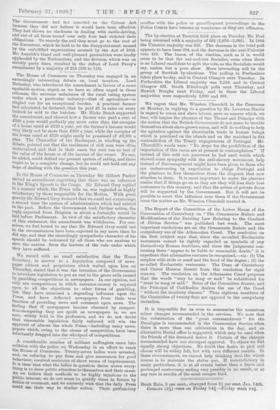The House of Commons on Thursday was engaged in an
exceedingly interesting debate on local taxation. Lord Helmsley, who introduced the amendment in favour of a more equitable system, urged, as we have so often urged in these columns, the extreme unfairness of the rural rating system under which a particular industry—that of agriculture—is Singled out for an exceptional burden. A practical farmer had calculated, he declared, that he paid 21 in rates on every bullock he sold to the butcher. Mr. Hicks Beach supported the amendment, and showed how a farmer who paid a rent of E240 a year would probably pay more rates than the occupier of a house rated at 2120 a year, yet the farmer's income would very likely not be more than 2200 a year, while the occupier of the house rated at 2120 might easily be possessed of 23,000 a Year. The Chancellor of the Exchequer, in winding up the debate, pointed out that the residences of rich men were often undervalued, and that in their cases the rent was no test of the value of the house or of the income of the owner. No one, he added, could defend our present system of rating, and there ought to be a complete change, but he could not hold out any hope of dealing with the question this year.






































 Previous page
Previous page